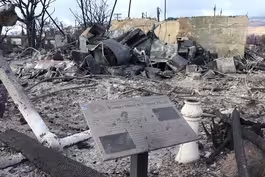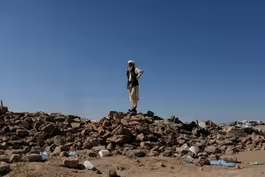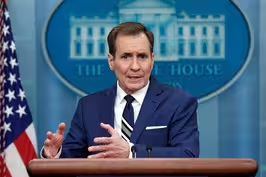
Tamara Keith and Amy Walter on pressure to elect new speaker
Clip: 10/9/2023 | 9m 14sVideo has Closed Captions
Tamara Keith and Amy Walter on pressure to elect House speaker after attack in Israel
NPR’s Tamara Keith and Amy Walter of the Cook Political Report with Amy Walter join Amna Nawaz to discuss the latest political news, including the lack of leadership in the House of Representatives and the pressure mounting on Republicans to elect a speaker amid calls for Ukraine and Israel aid.
Problems playing video? | Closed Captioning Feedback
Problems playing video? | Closed Captioning Feedback
Major corporate funding for the PBS News Hour is provided by BDO, BNSF, Consumer Cellular, American Cruise Lines, and Raymond James. Funding for the PBS NewsHour Weekend is provided by...

Tamara Keith and Amy Walter on pressure to elect new speaker
Clip: 10/9/2023 | 9m 14sVideo has Closed Captions
NPR’s Tamara Keith and Amy Walter of the Cook Political Report with Amy Walter join Amna Nawaz to discuss the latest political news, including the lack of leadership in the House of Representatives and the pressure mounting on Republicans to elect a speaker amid calls for Ukraine and Israel aid.
Problems playing video? | Closed Captioning Feedback
How to Watch PBS News Hour
PBS News Hour is available to stream on pbs.org and the free PBS App, available on iPhone, Apple TV, Android TV, Android smartphones, Amazon Fire TV, Amazon Fire Tablet, Roku, Samsung Smart TV, and Vizio.
Providing Support for PBS.org
Learn Moreabout PBS online sponsorshipAMNA NAWAZ: The House of Representatives is devoid of leadership, and pressure is mounting on Republicans to elect a speaker because of the need to approve aid not only for Ukraine, but now for Israel as well.
Here to break down the stakes are Amy Walter of The Cook Political Report With Amy Walter and Tamara Keith of NPR.
It's great to see you both.
Thanks for being here.
AMY WALTER, The Cook Political Report: Good to see you.
AMNA NAWAZ: So there's still no full-time speaker of the House, but the two declared candidates so far, Representatives Jim Jordan and Steve Scalise, have expressed solidarity with Israel, pledged their support after that brutal attack by Hamas.
But here is how their fellow Republican the chairman of the House Foreign Affairs Committee, Mike McCaul, weighed in on the issue today.
REP. MICHAEL MCCAUL (R-TX): I look at the world and all the threats that are out there are out there, and what kind of message are we sending to our adversaries when we can't govern, when we're dysfunctional, when we don't even have a speaker at the House?
And I think it sends a terrible message.
AMNA NAWAZ: Amy, that was Congressman McCaul yesterday.
Does any of this change the urgency of their need to elect a new speaker?
AMY WALTER: In theory, yes.
And, in theory, they could also get this done this week.
They can, and they are planning on having a vote by Wednesday or Thursday for a speaker.
The problem is, nobody has the votes.
And we will see after tonight, when they have their first sort of get-together, since this broke over the weekend, if there is any momentum, if there's something that could bring the elements of the party that were unhappy with McCarthy and those who are happy with McCarthy together for an alternative.
You also heard in the opening here about former Speaker McCarthy being open to the possibility.
The reality, though, for the speaker election has much more -- in terms of what the members are focusing on, it's much less about what it's sending to the world, the message it's sending to the rest of the world, or the impact even on aid to Israel.
It's much more about the immediate, including what it means for funding of the government, which we know is going to run out in November, and the rules for how another speaker could be ousted.
That's where their focus is right now.
AMNA NAWAZ: Tam, how are you looking at this?
TAMARA KEITH, National Public Radio: Right.
So former Speaker McCarthy stepped into the vacuum of leadership today, held a press conference at the Capitol, gave a five-point plan on Israel, and then said, like, the majority of Republicans wanted me to continue to be speaker.
So you almost can add him to the other two candidates.
And none of them, as Amy says, at the moment, have 217 votes to be speaker.
They are under increased pressure to fix this, to do something, to end the chaos.
It's not clear how they get out of it, though I will say that John Kirby, in a briefing that he just held with reporters, said that, in terms of aid for Israel, there's a standing relationship, there are standing appropriations.
And so the -- that may not be the thing that has the urgency.
Getting intelligence briefings to the leader of the House, now, that's something that has some urgency.
AMNA NAWAZ: Well, what about aid for Ukraine?
Is there any information on that?
TAMARA KEITH: Well, the situation with aid for Ukraine, it's not clear how this will affect that.
The White House is still trying to figure that out.
Kirby again said that there is an urgent need for aid for Ukraine.
One question that I had coming into this leadership battle is, will the candidates for speaker commit to not bringing Ukraine aid up to the floor?
Although there is a large bipartisan group of lawmakers who support aid for Ukraine's war effort, there is a small vocal and overlapping with those who voted Kevin McCarthy out group of Republicans who really, really don't want that Ukraine aid to get a vote, and the speaker controls the floor.
AMNA NAWAZ: Amy, what about where the American public is right now?
We have seen there's still, I think, majority support for supporting Ukraine and their war against Russia, but we have seen American support declining to continue arming Ukraine.
As the U.S. now gets involved on another front now, which is supporting Israel, where is the American public on that?
AMY WALTER: Well, I think there will be an initial rallying around Israel.
And this is a very special relationship that America and many Americans have with Israel.
So I think that will be where we are initially.
But, for the public, what's happening overseas is really something that they don't see as affecting their day-to-day lives.
And especially when it comes to politics, they are much more interested in what's happening domestically.
When what's happening overseas impacts them domestically, that's when we start to see the engagement, like you were talking about with the -- back in the 2008-'9, the really overwhelming frustration with the dragged-out war in Afghanistan and Iraq.
We're not at that point right now, but certainly what you see for a Republican Party is very much divided on the question of Ukrainian aid.
And maybe that's not a good way to say it, though.
I don't know that they're that divided.
I do think that the majority of Republicans on Capitol Hill, elected officials, want to see more aid going to Ukraine, but there is a strong enough faction that is stopping that.
And that includes some members of the Republican Party who are running for president.
AMNA NAWAZ: Tam, you heard John Kirby tell Geoff earlier that he's very optimistic, feels very good that the White House and the administration is prepared to handle all of these multiple fronts, right, the war in Ukraine, countering China, and now supporting Israel.
But what does your reporting show?
Do they have both the political capital and the consensus to do all that?
TAMARA KEITH: What's fascinating is, President Biden last week announced that he was going to give a major address on Ukraine to try to make the case to the American people that this is something that they should still care about and should still be invested in.
Now he may have to give a major address on Israel and Ukraine.
And as I was looking into sort of the approach to that speech, I talked to a number of allies of the White House who said that President Biden hadn't really made the case to the American people.
Like, he had sort of been quiet on Ukraine for a domestic audience and that that was a mistake.
Well, now you have yet another front here.
One thing that is important to point out, a big difference between Iraq and Afghanistan is, there are not U.S. boots on the ground.
AMNA NAWAZ: Yes.
AMY WALTER: Right.
TAMARA KEITH: And that is a very big difference and something that the White House hasn't exactly driven home as part of their pitch.
AMY WALTER: But this is the battle.
We're going to see these lines drawn up, theoretically, if we have a Trump and Biden rematch... TAMARA KEITH: Oh, yes.
AMY WALTER: ... between an America first and America's place is as a global leader.
Now, this is also something that's dividing the Republican presidential primary.
This is the case that Nikki Haley makes, saying, we have to be as strong as we are in Ukraine, as we are in Israel, as we are in China.
The United States, when there's a vacuum, bad things fill it.
The United States still, as a global leader, is critically important.
You're also going to hear the case being made by Republicans, regardless of where they are on Ukraine, that an unsafe world and a border that is obviously -- we have a significant problem at the border, in terms of... AMNA NAWAZ: You're talking about the U.S. Southern border.
AMY WALTER: The U.S. border -- sorry -- the Southern border of the United States.
AMY WALTER: Making that link between, here's where the scariness across the world can come in through our Southern border.
That makes the U.S. unsafe.
So, expect to see much more of linkage between immigration, what we call immigration reform, and what is happening overseas.
AMNA NAWAZ: And, Tam, we did see a number of the candidates for the Republican presidential nomination weighing in on this over the weekend, Nikki Haley, of course, who has those foreign credentials to some degree, but also Mr. Trump laying the blame solidly at the feet of President Biden.
Does this change the Republican side of the equation?
And how does the White House plan to counter that?
TAMARA KEITH: Right.
So, blaming President Biden is a really easy move, and which is why we saw pretty much every single Republican presidential candidate go that direction, why you saw RNC Chairwoman Ronna McDaniel saying this moment is an opportunity for Republicans.
It certainly is a potential area of contrast.
It also hearkens back to 2015-2016, when there were a couple of terrorist attacks, when the primary field on the Republican side was still very -- it hadn't gelled yet.
Former President Trump came out in a very strong way, calling for a Muslim ban, things that seemed anathema to many Americans, but really helped cement his lead in the Republican primary.
And so now we're back in a moment where he's making much of the same rhetorical case.
AMNA NAWAZ: We're seeing him say some of those same things this year as well.
Tam Keith and Amy Walter, always good to see you both.
Thank you so much.
AMY WALTER: Thank you.
TAMARA KEITH: You're welcome.
Israeli woman describes how Hamas kidnapped her husband
Video has Closed Captions
Clip: 10/9/2023 | 7m 21s | Israeli attack survivor describes moment Hamas militants kidnapped her husband (7m 21s)
Israel levels parts of Gaza in retribution for Hamas attack
Video has Closed Captions
Clip: 10/9/2023 | 5m 43s | Israel levels parts of Gaza in retribution for Hamas terror attack (5m 43s)
Native Hawaiians push to preserve heritage after wildfires
Video has Closed Captions
Clip: 10/9/2023 | 5m 34s | Native Hawaiians push to preserve history and heritage following Maui wildfires (5m 34s)
News Wrap: Thousands killed in Afghanistan earthquake
Video has Closed Captions
Clip: 10/9/2023 | 5m 41s | News Wrap: Afghanistan earthquake survivors search through rubble for loved ones (5m 41s)
NSC spokesman says no evidence Iran helped plan Hamas attack
Video has Closed Captions
Clip: 10/9/2023 | 7m 39s | NSC spokesman says Iran 'complicit' in Hamas terror but no evidence it helped plan attack (7m 39s)
Simone Biles cements status as greatest gymnast
Video has Closed Captions
Clip: 10/9/2023 | 6m 37s | Simone Biles cements status as greatest gymnast with record-breaking world championship (6m 37s)
Providing Support for PBS.org
Learn Moreabout PBS online sponsorship
- News and Public Affairs

FRONTLINE is investigative journalism that questions, explains and changes our world.

- News and Public Affairs

Amanpour and Company features conversations with leaders and decision makers.












Support for PBS provided by:
Major corporate funding for the PBS News Hour is provided by BDO, BNSF, Consumer Cellular, American Cruise Lines, and Raymond James. Funding for the PBS NewsHour Weekend is provided by...





